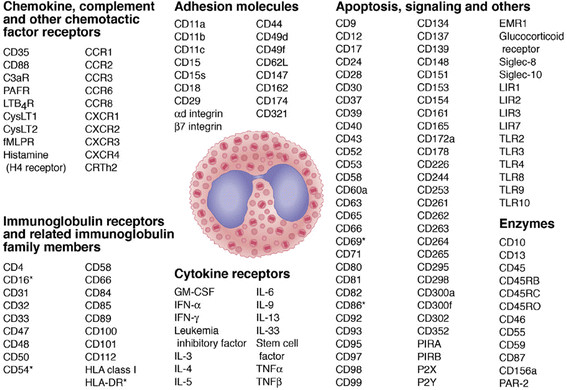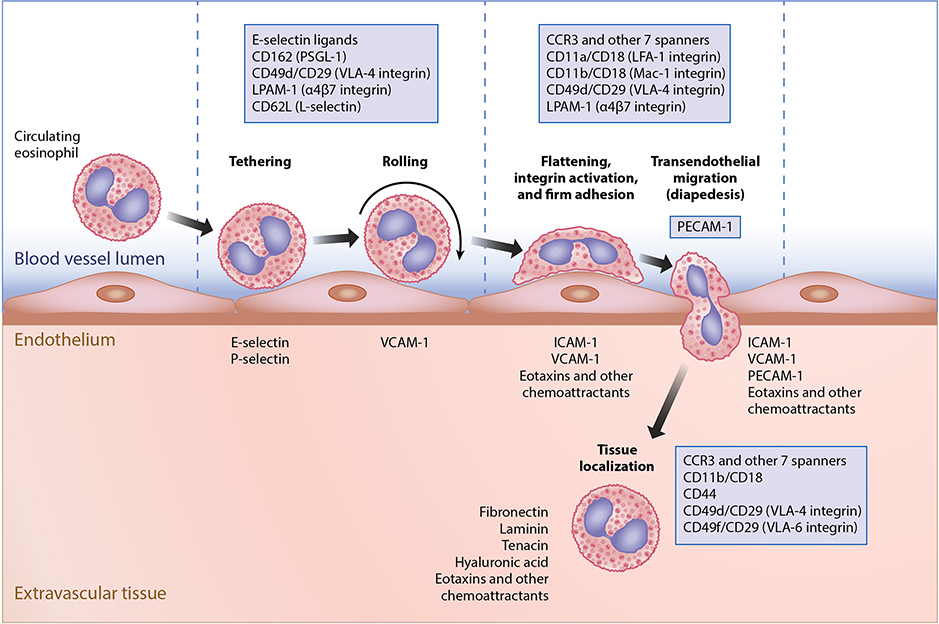CD Antigen (Eosinophils)
Related Symbol Search List
Immunology Background
Available Resources for CD Antigen (Eosinophils) Research
Creative BioMart is committed to providing eosinophil CD antigen-related products, services to researchers, scientists, and medical professionals who are interested in studying and understanding the role and function of eosinophils and their CD antigens in various biological processes. and resources.
These include eosinophil CD antigen-related recombinant proteins, protein-pre coupled magnetic beads, cell and tissue lysates, antibodies, chromatography reagents, and others. |
We can design and generate eosinophil-specific CD antigen antibodies, recombinant proteins, peptides, and others according to customer needs. |
We provide extensive resources on CD antigens (eosinophils) designed to explore the latest research available to researchers to understand the functions and regulatory mechanisms of CD antigens. |
About CD Antigen (Eosinophils)
Eosinophils are a type of white blood cell that plays a key role in the immune system's response to parasitic infections, allergic reactions, and inflammation. These cells are characterized by the presence of specific cell surface antigens known as CD antigens, which help identify and differentiate them from other cell types.
CD antigens are cell surface proteins that are expressed on different cell types, including eosinophils. These antigens serve as markers that can be used to identify and characterize specific cell populations. Eosinophils, for example, express a number of CD antigens, such as CD11b, CD16, CD18, CD44, and CD69.
By studying the expression of these CD antigens on eosinophils, researchers can gain a better understanding of how these cells function in the immune response. This knowledge can help in the development of new therapies for conditions where eosinophils play a critical role, such as asthma, allergic rhinitis, and certain parasitic infections.
 Fig.1 Surface molecules expressed by human eosinophils. (Carr TF, et al., 2016)
Fig.1 Surface molecules expressed by human eosinophils. (Carr TF, et al., 2016)
The Functions of CD Antigen in Eosinophils
CD antigens expressed on eosinophils play important roles in immune responses and inflammation. Here are some functions of CD antigens in eosinophils:
- Adhesion and Migration: CD antigens such as CD11b, CD18, CD29, CD44, and CD49d are involved in adhesion to endothelial cells and extracellular matrix components, allowing eosinophils to migrate from the bloodstream to sites of inflammation or infection. These interactions facilitate the recruitment of eosinophils to specific tissues or organs where they are needed.
- Activation and Degranulation: Upon activation, eosinophils can release a variety of toxic granule proteins, cytokines, chemokines, and lipid mediators that contribute to immune responses and inflammation. CD antigens like CD9, CD23, CD69, and CD193 (CCR3) are associated with eosinophil activation and degranulation, enhancing their effector functions.
- Immunoglobulin-Mediated Responses: CD23, also known as the low-affinity IgE receptor, is expressed on eosinophils and plays a role in immunoglobulin-mediated immune responses. It is involved in the binding and internalization of IgE immune complexes, leading to the activation and functional modulation of eosinophils.
- Chemotaxis and Recruitment: CD193 (CCR3) is a chemokine receptor highly expressed on eosinophils. It interacts with chemokines like eotaxins (e.g., CCL11) and regulates eosinophil chemotaxis and recruitment to inflammatory sites. CD193 is crucial for the accumulation of eosinophils in various allergic and inflammatory conditions.
- Interactions with Other Immune Cells: CD45, a transmembrane protein tyrosine phosphatase, is expressed on eosinophils and is involved in immune cell signaling and communication. It plays a role in modulating immune responses and regulating the activation state of eosinophils through interactions with other immune cells.
- Survival and Proliferation: CD25, also known as the interleukin-2 receptor alpha chain, is expressed on eosinophils and is associated with their survival and proliferation. It plays a role in response to certain cytokines and growth factors, promoting the expansion and maintenance of eosinophil populations.
The functions of CD antigens on eosinophils are interconnected and contribute to the overall immune response and inflammatory processes. They enable eosinophils to migrate, interact with other immune cells, release inflammatory mediators, and participate in immune defense against parasites, as well as in allergic reactions and other inflammatory conditions.
 Fig.2 Mechanisms involved in eosinophil extravasation during inflammation. (Klion AD, et al., 2020)
Fig.2 Mechanisms involved in eosinophil extravasation during inflammation. (Klion AD, et al., 2020)
The Various Research Applications of CD Antigen in Studying Eosinophils
CD antigens expressed on eosinophils have diverse research applications and are widely used as markers for studying eosinophil biology and their involvement in various physiological and pathological conditions. Here are some research applications of CD antigens in studying eosinophils:
- Eosinophil Identification and Isolation: CD antigens are valuable markers for identifying and isolating eosinophils from complex cell populations. By using specific combinations of CD antigens, such as CD45, CD193 (CCR3), and CD16, researchers can selectively isolate eosinophils from peripheral blood, tissues, or other biological samples. This enables the study of pure eosinophil populations for further analysis.
- Functional Studies: CD antigens on eosinophils are associated with specific functional properties. Researchers can use flow cytometry or other techniques to assess the expression levels of CD antigens on eosinophils and correlate them with various functional parameters. For example, studying the expression of CD69, CD11b, or CD44 on activated eosinophils can provide insights into their activation state and functional capabilities.
- Eosinophil Activation and Degranulation: CD antigens, such as CD23 and CD69, are involved in eosinophil activation and degranulation. Researchers can investigate the expression and modulation of these antigens in response to different stimuli or in specific disease contexts to understand the mechanisms underlying eosinophil activation and the release of inflammatory mediators.
- Immune Cell Interactions: CD antigens expressed on eosinophils facilitate interactions with other immune cells. By studying the expression and dynamics of CD antigens, such as CD18, CD29, or CD54, researchers can explore the adhesion, migration, and communication between eosinophils and other immune cells, such as T cells, dendritic cells, or mast cells.
- Disease Associations and Biomarkers: Altered expression profiles of CD antigens on eosinophils have been observed in various diseases, including asthma, allergies, eosinophilic esophagitis, and parasitic infections. Researchers can use CD antigens as biomarkers to assess disease severity, monitor treatment responses, or investigate the underlying mechanisms of disease pathogenesis.
- Drug Development and Therapeutic Targets: CD antigens on eosinophils can serve as potential targets for therapeutic interventions. Researchers can identify novel targets by studying the expression patterns and functional relevance of CD antigens in specific disease conditions. This information can aid in the development of targeted therapies for eosinophil-associated diseases.
Overall, the study of CD antigens on eosinophils provides valuable insights into eosinophil biology, immune responses, and their involvement in various diseases. These antigens serve as important tools for researchers to characterize, isolate, and manipulate eosinophils, leading to a better understanding of their role in health and disease.
Creative BioMart is dedicated to customer satisfaction and is committed to providing quality products and services to researchers, scientists, and companies worldwide. We will be happy to support your research projects and experiments to help you achieve more success. Feel free to contact us for more information!
Related References
- Rosenberg HF. Eosinophils. Encyclopedia of Immunobiology. 2016;334-344.
- Carr TF, Berdnikovs S, Simon HU, Bochner BS, Rosenwasser LJ. Eosinophilic bioactivities in severe asthma. World Allergy Organ J. 2016;9:21.
- Klion AD, Ackerman SJ, Bochner BS. Contributions of Eosinophils to Human Health and Disease. Annual Review of Pathology. 2020 Jan;15:179-209.
- Nishikawa K, Morii T, Ako H, Hamada K, Saito S, Narita N. In vivo expression of CD69 on lung eosinophils in eosinophilic pneumonia: CD69 as a possible activation marker for eosinophils. J Allergy Clin Immunol. 1992;90(2):169-174.
